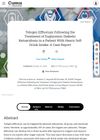 148 citations,
April 2009 in “Molecular Pharmaceutics”
148 citations,
April 2009 in “Molecular Pharmaceutics” Researchers developed promising agents for prostate cancer imaging, with the best one showing high potential for clinical use.
 January 2018 in “Elsevier eBooks”
January 2018 in “Elsevier eBooks” The document concludes that alopecia has various forms, each with specific treatments, but no definitive cure for certain types like CCCA has been proven.
 11 citations,
January 1998 in “Dermatology”
11 citations,
January 1998 in “Dermatology” Spironolactone works well for acne and hirsutism, isotretinoin is very effective for acne and may have antiandrogenic effects, and 5 alpha-reductase inhibitors should be considered antiandrogens.
 4 citations,
March 2012 in “InTech eBooks”
4 citations,
March 2012 in “InTech eBooks” Tree leaves and lichens can effectively indicate air pollution levels in cities.
1 citations,
January 2018 in “Advances in cancer prevention” Preventing cancer involves lifestyle changes, vaccinations, early screening, and understanding cancer's molecular basis.

Hair loss can occur after treating diabetic ketoacidosis, especially with rapid weight loss and high soft drink intake.
5 citations,
January 2012 in “International journal of trichology” Chemotherapy-induced hair loss is a major concern, but various treatments show promise in preventing and reversing it.
 19 citations,
January 2012 in “Biomolecules & Therapeutics”
19 citations,
January 2012 in “Biomolecules & Therapeutics” Grateloupia elliptica extract may help prevent hair loss and promote hair growth.
36 citations,
May 2005 in “BMC dermatology” DPCP is effective for treating severe alopecia areata, but relapse is common.
 September 1997 in “JEADV. Journal of the European Academy of Dermatology and Venereology/Journal of the European Academy of Dermatology and Venereology”
September 1997 in “JEADV. Journal of the European Academy of Dermatology and Venereology/Journal of the European Academy of Dermatology and Venereology” Psychological factors play a significant role in developing alopecia areata.
 13 citations,
April 2017 in “Journal of Alternative and Complementary Medicine”
13 citations,
April 2017 in “Journal of Alternative and Complementary Medicine” Traditional and complementary medicine may help with skin conditions, but more high-quality research is needed.
 14 citations,
March 2016 in “Mechanisms of Development”
14 citations,
March 2016 in “Mechanisms of Development” Basonuclin 2 is vital for the development of facial bones, hair follicles, and male germ cells in adult mice, and its absence can lead to dwarfism and abnormal follicles.
 April 2005 in “Aktuelle Dermatologie”
April 2005 in “Aktuelle Dermatologie” Shampoos have evolved to address individual hair and scalp needs, and treatments like Minoxidil and Finasteride help with hair loss.

Some medications, including retinoids, antifungals, and psychotropic drugs, can cause reversible hair loss if stopped or doses are reduced.
 12 citations,
January 2019 in “Journal of Endocrinology”
12 citations,
January 2019 in “Journal of Endocrinology” Baicalin may help reduce excessive male hormone levels in PCOS.
 6 citations,
November 2017 in “Scientific reports”
6 citations,
November 2017 in “Scientific reports” The R343H mutation in the VDR gene causes vitamin D-resistant rickets with alopecia by impairing specific gene activity.
 1 citations,
April 2020 in “bioRxiv (Cold Spring Harbor Laboratory)”
1 citations,
April 2020 in “bioRxiv (Cold Spring Harbor Laboratory)” Goat skin changes with the seasons due to genes affected by daylight and hormones.
 October 2024 in “Frontiers in Pharmacology”
October 2024 in “Frontiers in Pharmacology” Genetic variants can affect valproic acid's effectiveness, side effects, and levels in epilepsy treatment.
 4 citations,
March 2023 in “Current Oncology”
4 citations,
March 2023 in “Current Oncology” Scalp cooling is the only FDA-approved method to prevent hair loss from chemotherapy, but other treatments like minoxidil and PRP are being tested.
 October 2023 in “The Cochrane library”
October 2023 in “The Cochrane library” The medicine baricitinib was found to notably improve hair regrowth in alopecia areata, but more research is needed on its side effects and other treatments.
 28 citations,
September 2020 in “Pharmaceutics”
28 citations,
September 2020 in “Pharmaceutics” 3D-printed mesoporous scaffolds show promise for personalized drug delivery with controlled release.
 May 2023 in “Materials research foundations”
May 2023 in “Materials research foundations” Nanomaterials like silver and gold can improve wound healing but need more research for safety.
 125 citations,
September 2019 in “Journal of Clinical Immunology”
125 citations,
September 2019 in “Journal of Clinical Immunology” Foxp3 is crucial for regulatory T cell function, and targeting these cells may help treat immune disorders.
 2 citations,
May 2017 in “International journal of pharmacy and pharmaceutical sciences/International Journal of Pharmacy and Pharmaceutical Sciences”
2 citations,
May 2017 in “International journal of pharmacy and pharmaceutical sciences/International Journal of Pharmacy and Pharmaceutical Sciences” Hutchinson-Gilford Progeria Syndrome is a rare genetic disorder caused by a specific gene mutation, characterized by aging symptoms and managed by monitoring heart health and using low-dose aspirin.
 58 citations,
November 2013 in “Journal of Innovative Optical Health Sciences”
58 citations,
November 2013 in “Journal of Innovative Optical Health Sciences” Multiphoton microscopy is a promising tool for detailed skin imaging and could improve patient care if its challenges are addressed.
 1 citations,
July 2023 in “Foods”
1 citations,
July 2023 in “Foods” Mushrooms offer benefits for food, energy, and water security, and have potential uses in health and environmental applications.
 35 citations,
October 2015 in “International Journal of Pharmaceutics”
35 citations,
October 2015 in “International Journal of Pharmaceutics” Tiny particles carrying roxithromycin can effectively target and deliver the drug to hair follicles without irritation.
 6 citations,
April 2013 in “International Journal of Dermatology”
6 citations,
April 2013 in “International Journal of Dermatology” Valproic acid helped hair growth in alopecia patient; more research needed.
 July 2023 in “International Journal of Endocrinology”
July 2023 in “International Journal of Endocrinology” Centratherum anthelminticum seed extract effectively treats Polycystic Ovary Syndrome in rats.
 April 2019 in “Journal of the Dermatology Nurses’ Association”
April 2019 in “Journal of the Dermatology Nurses’ Association” A 37-year-old man with hair loss and skin issues was successfully treated with oral antibiotics, highlighting the need for early treatment. Long-term care includes low-dose antibiotics and avoiding caps and wigs.


























